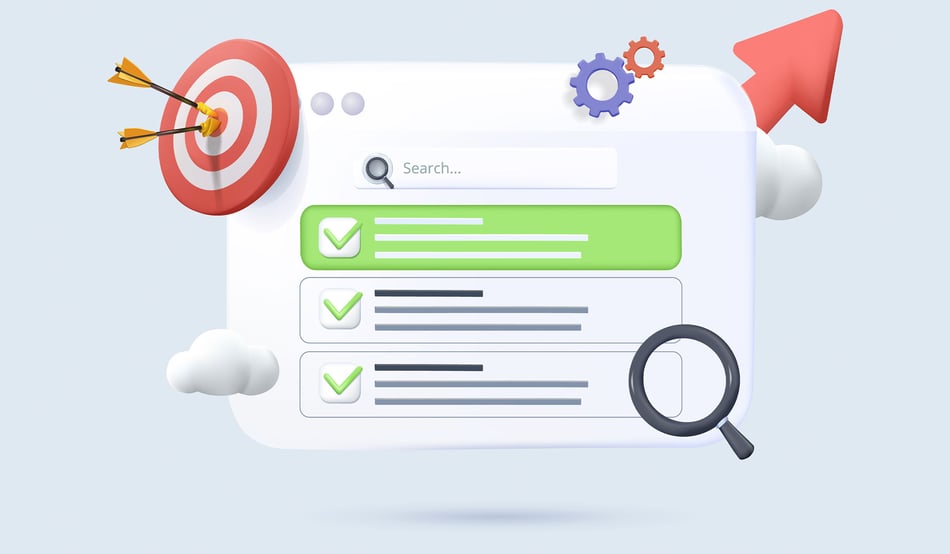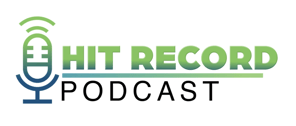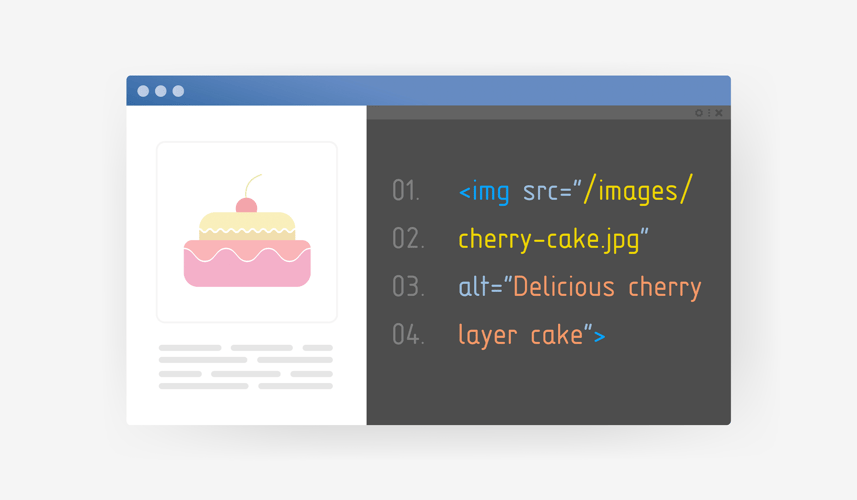Episode 44 - How to Structure New Website Pages for Successful Organic Search


Don't Miss An Episode, Subscribe Now

When building a client's new website, they often suggest to group multiple products on one website page. We don't recommend putting multiple product lines on your pages because it ruins the SEO value.
So when a client says, "I want to put RVs, ATVs, boat loans, and UTVs all on one page" -- we start the conversation by trying to explain the SEO value behind not only the single pages, but your root domain as a whole. Each individual product page should be utilizing the best keywords for SEO in URLs, in the metadata, in the on-page header, in your image alt text, and you're on-page headers throughout the page.
Tune-in for best practices for your product page structures.
Transcription:
If you're looking for best practices for your bank or credit union, join us while we talk all things sales, marketing, and strategy for financial institutions. Let's make it happen with FI GROW Solutions..
Meredith Olmstead:
Hi there. I'm Meredith Olmstead, CEO and Founder of FI GROW Solutions. We are a digital marketing and sales consulting agency, and we work exclusively with banks and credit unions. I'm here today with Penne VanderBush. She is our head of strategy. She works with all of our clients. And we were just having a fun, funny, and also informative conversation about websites, and for banks and credit unions. Specifically because we are building websites pretty much all the time now.
We have one website project going on. And we're building a website, or we're building, like I said, ongoing websites for clients. And one of the things that we run into with clients all the time when we're building their new website is they are constantly trying to group multiple products on one website page. Now I'll say, most of the time this is budget-driven because they pay us to write per page very high-quality SEO optimized content. It takes a lot of research, a lot of time and effort goes into it, to structuring pages with all of their on-page SEO in place, and all very strategically organized and thought through to drive traffic in the future.
And so we always have to push back and say, "Look, we can't put multiple product lines on your pages because it totally ruins the SEO value." So Penne and I are like, "Let's make a podcast about this because it really is a regular problem that we run into and we might as well talk about it." So Penne, when somebody says, "Oh, I want to put RVs, ATVs, boat loans, and UTVs all on one page," what do you say?
Penne VanderBush:
Right. We start the conversation by trying to explain the SEO value behind not only the single pages, but your root domain as a whole. To break that down a little bit, each individual product page should be utilizing the best keywords for SEO in URLs, in the metadata, in the on-page header, in your image alt text, and you're on-page headers throughout the page. And so when you create a page where you're utilizing multiple keywords across a bunch of product lines, it's really difficult for a search engine to determine what value that page is bringing.
Also, when we look at the overall domain authority and health of the root domain, when a search engine, let's say Google, is looking at your domain and indexing it, if you have a lot of individual pages about specific product lines, it helps your overall domain authority because it's easy for the search engine to understand that you have a lot of loan products. It's easy to say, "This website can offer recreational vehicle loans, and auto loans, and ATV loans, and boat loans."
What you're trying to do is cast a web, if you will, like when we talk about content clusters, creating a lot of high-value pages under your root domain that are going to help boost your overall domain ranking and authority for your site as a whole. And then it can also perform on those individual pages far better, which we are very excited because we were looking at some data to support that. And that's kind of what sparked this conversation where we said, "We need to hit record," because we speak to this hypothetically, if you will, but everyone knows it's best practice. But then when you can align it with the data where we say, "Yes, we actually can prove that this works," that's where the rubber needs the road.
Meredith Olmstead:
Before we jump into the data, the other thing that we were talking about, we were kind of laughing about this, is make sure, when you're designing our pages ... If everybody's bought in, like okay, we can do checking accounts on one page, we'll do savings accounts. You may even break out specific types of those accounts potentially.
So you might have a youth checking account on its own page, because people do search youth checking. You might have a credit builder version of a checking account. You might have a rewards checking. Those might be on their own pages. But we do also work with clients who sometimes they want to come up with these creative names for accounts to try to maybe brand, make it sound cool if it's a youth checking account or whatever. They come up with kind of a funky name. Remember that even though those names might have really nice brand impacts, they might be great for a user experience, they might help somebody remember your options once they see those options on your website. Don't let those kinds of creative names undermine the SEO value of other content on your website, because a lot of the time those names are not going to be searchable.
I'll give you an example of two different ones. One would be like second chance checking. Second chance checking is very searchable. There's lots of search volume out there. If you have a strategy for reaching people who are trying to proactively, responsibly rebuild their credit, a second chance checking account option with second chance content on it is great. But coming up with a funny name for it, like Builder Checking or Rebuilder Checking or something, I can't even think of an example, but that might not ... While you're trying to get it in front of people who might be searching second chance checking, by giving it a more creative name, that's undermining the SEO searches that would drive people potentially to the page, if that makes sense.
Penne VanderBush:
Yeah, and I think it's important if you already have a product like this and you don't want to rename it, that's understandable. Just make sure that the keywords that really bring SEO value are in all the right places. Your URL string, your metadata, your H1, your H2s.
Meredith Olmstead:
Totally.
Penne VanderBush:
Work with your website vendor as well because you can have a header on your webpage look like an H1, look like that larger font size, but actually have it coded as like an H4, H5 or H6 behind the scenes. So if you can work with your website developer, you can have the uses of the keywords that are going to help you better optimize maybe appear visually smaller on the page, but if they're coded correctly behind the scenes, then that can help you still rank with authority for those terms.
Meredith Olmstead:
Yeah. I love that feature, because a lot of times I think people get confused by the aesthetic value of H1s, H2s, H3s, and how your web designer may have designed the page to look, versus the actual technical value or the technical benefit of H1s, H2s, H3s. On the back end of all of our websites, we basically have a feature where you can have your header display as an H2, but have the real value be an H4 or an H3 or an H5. So useful, really great.
Penne VanderBush:
Absolutely. Very important.
Meredith Olmstead:
All right, so the data. You said, you mentioned, and we talked about boat loans and you talked about some data. What can you share with us about data?
Penne VanderBush:
Yeah. We had a client, they had one page when we started working with them before their website build. They had RVs, ATVs, UTVs, and boats all on the same page. That's a hot mess of keywords for-
Meredith Olmstead:
Super common.
Penne VanderBush:
... as search engine to ... Yes.
Meredith Olmstead:
Super common.
Penne VanderBush:
But we see it all the time. So we recommended separating them out. In less than a year, less than 12 months, the boat loan page started ranking third organically in search. And this is a Texas-based client. The search term "boat loans in Texas," which is popular search term, they were ranking in that third spot organically.
And not only were they ranking in the third spot organically, they were getting 50% of the clicks for that search term. That tells us that our page title, the meta description, what you see in the search results, what you've coded on your page to actually display, they were getting half the clicks-
Meredith Olmstead:
Wow.
Penne VanderBush:
... over the first and second position inorganic. So that's how important it is to make sure that those page titles and your preview texts that you're going to see there, whether your website's pulling that on pager from your meta description, should be meta, but we've seen it where it's not. So just making sure that that's really important.
And then the RV loans. For search terms, "RV loans in Texas" and "zero down RV financing,", it's currently ranking 16th, so we're on that second page, but it's climbing and we continue to see the progress on that. So keep in mind, these are terms and pages like, they weren't ranking at all. I mean they were so far down, nobody was going to find them. They would've been fifth page of search results prior to separating them out like this.
ATV and UTV is incredibly competitive in that marketplace. Organically they're still ranking in the 22nd position for these terms. But our strategy on that is going to be paid advertising to help boost, get them in that spot. And then continue content clusters, which we talk a lot in other episodes on this podcast, about the value of content clusters and how they can support your product pages to help them rank organically. So those ones that are more competitive, you need to do some more work around those.
But just for this client to be able to take a page that combines so many products that wasn't ranking at all for any of them, and in less than a year to be able to get one of those product lines in the third position organically, and then to have another one of those product lines on that second page but still climbing towards that first page, in the world of SEO that's pretty fast results for something that didn't have paid ad support at all. That's truly just organic in the work that we did on those webpages. So I think that really shows you the value of separating those products that way and getting-
Meredith Olmstead:
Yeah. And the nice thing about that too is that those smaller kinds of almost point-of-sale loans, I mean, it's not properly point-of-sale because they're not getting it through the boat loan or the boat dealer or dealership, but those kinds of small, very niche kinds of lending products are actually a really nice entry point for new customers. It's really hard ask, to be like, "Hey, change your checking account." People are like, "No. But, "Get a boat loan with us," now give them stellar customer service, and you become a brand that moves up in their hierarchy or top of mind for thinking, "Okay, down the future, maybe I'll try a home equity with them next." And then maybe they do come into a situation where they want to make you their primary financial institution.
So it's a really good entry point for people in those niche markets. Awesome stuff.
Penne VanderBush:
Absolutely.
Meredith Olmstead:
All right. Well, thank you so much, Penne. Thanks for sharing the data.
Penne VanderBush:
Thank you.
Meredith Olmstead:
I love seeing the data. I hope this was helpful to you all. Please feel free to visit us figrow.com. We have lots of other great podcasts, they're all really nice and short and sweet. Lots of good actionable tips for marketers out there. And in the meantime, let's just all get out there and make it happen.








Blog comments